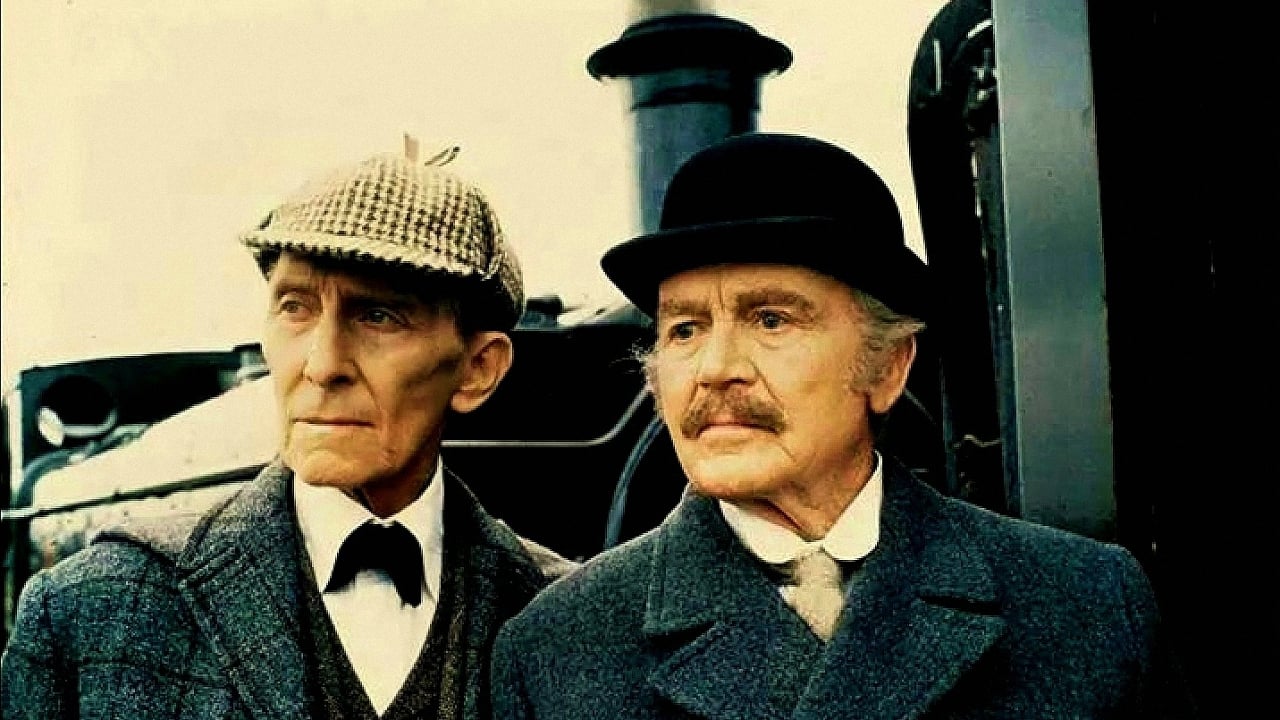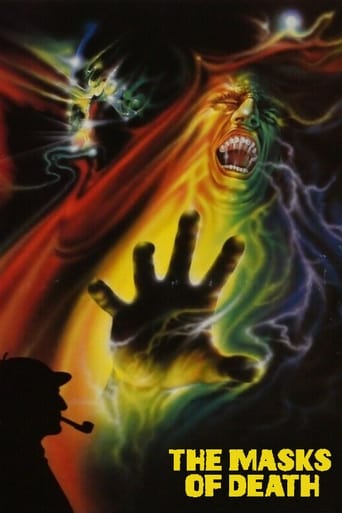Develiker
terrible... so disappointed.
Freaktana
A Major Disappointment
Raymond Sierra
The film may be flawed, but its message is not.
Kinley
This movie feels like it was made purely to piss off people who want good shows
TheLittleSongbird
Am a huge fan of Sherlock Holmes and get a lot of enjoyment out of Arthur Conan Doyle's stories. Also love Basil Rathbone's and especially Jeremy Brett's interpretations to death. So would naturally see any Sherlock Holmes adaptation that comes my way, regardless of its reception.Furthermore, interest in seeing early films based on Conan Doyle's Sherlock Holmes stories and wanting to see as many adaptations of any Sherlock Holmes stories as possible sparked my interest in seeing 'The Masks of Death', especially one with such a great idea with Sherlock Holmes in his twilight retirement years.There are better Sherlock Holmes-related films/adaptations certainly than 'The Masks of Death', the best of the Jeremy Brett adaptations and films of Basil Rathone fit under this category. It's also not among the very worst, although one of the lesser ones overall, being much better than any of the Matt Frewer films (particularly 'The Sign of Four') and also much better than the abominable Peter Cook 'The Hound of the Baskervilles'.By all means, 'The Masks of Death' is not without imperfections. The story is not always focused, with a few too many abrupt shifts and characters coming and going. Some of the pace could have been tighter.Ray Milland to me also seemed ill at ease and out of place, ill health showing and not gelling with the period.However, 'The Masks of Death' looks handsome in period detail and is filmed nicely if not lavishly. Roy Ward Baker's direction gets the best out of the cast and keeps the mystery interesting, while the writing is intelligent, literate and probes though.While not perfect in execution, the story is intriguing with a quiet nostalgia and subtle tension. Most of the pacing is swift. The ending is chilling. Peter Cushing is an excellent Holmes and shares a charming chemistry with John Mills' equally good Watson. A legendary literary partnership done justice. Anne Baxter's Irene Adler beguiles. Cast is fine on the whole, with the only reservation being Milland. Overall, well done. 7/10 Bethany Cox
MARIO GAUCI
This original Sherlock Holmes case (from a story by Anthony Hinds under his John Elder alias) also marks Peter Cushing's last starring role – he had first played the fastidious Baker Street detective in Hammer's 1959 version of THE HOUND OF THE BASKERVILLES, reprised in two TV series in 1964 and 1968 (during the course of which he eventually relinquished the part to Douglas Wilmer). His inseparable sidekick, Dr. John Watson, was interpreted by the likes of Andre' Morell, Nigel Stock and, here, Sir John Mills. Incidentally, given the actors' age, the film starts off with Holmes (typically and, in spite of Cushing's frail look, he is made to don a couple of disguises throughout) in retirement, his adventures being recounted to reporter Susan Penhaligon – whose appearance is relegated to this brief prologue, never subsequently picked up! Seeing the cast at work, one gets the feeling he is visiting a veterans' retirement home: supporting the leads, among others, are Ray Milland and Anne Baxter (both of whom would be dead within 2 years), Anton Diffring and Gordon Jackson! Anyway, the main narrative – set on the eve of WWI – seems to incorporate two unrelated mysteries (mildly thrilling but not really horrific, as I had been led to believe!) but which, unsurprisingly, are found to be connected: the first involves a number of corpses discovered bearing the titular countenance, the second the alleged kidnapping of the young heir to the German throne. The main setting, then, is Diffring's county manor – where Holmes runs into an old nemesis, Baxter, one of the very few who had ever managed to outwit him! – but the climax takes place in an underground lair, with our heroes incongruously resorting to shooting their way out of trouble! All in all, the film is an adequate (and pleasingly old-fashioned) time-passer, its biggest reward undoubtedly emerging Cushing's always delightful turn as Sir Arthur Conan Doyle's master sleuth. Even so, the sheer fact that so many of its participants – Cushing, Diffring, Milland, Penhaligon, Ward Baker and Elder – had previously excelled in the horror genre makes the surprising lack of it here seem doubly disappointing.
Prof-Hieronymos-Grost
A now retired Holmes (Peter Cushing) is called on one last time to assist Scotland Yard with a strange case, that they can shed no light on. Three bodies have been found, one in the Thames and two others in Whitechapel, all bearing a hideous look of fear on their faces, but all showing no signs of cause of death. Holmes is intrigued enough to take the case and with Watson (John Mills) in tow he sets out to solve it. However before he can, he is called on by the Home Secretary (Ray Milland) and a stranger who wants to keep his identity to himself, their plea is for assistance in the case of a missing German envoy, his disappearance, they claim could cause the outbreak of War between England and Germany. The stranger is Graf Udo Von Felseck (Anton Diffring) a German diplomat close to the Kaiser, Holmes impresses Von Felseck as he deduces both his name and his political affiliation. Holmes takes the case and soon finds himself mixed up with a plot to kill millions, he also gets involved with "That Woman" again, one Irene Adler.(Anne Baxter) Pretty decent TV movie from Tyburn films, with a good intricate plot and a fantastic cast, Cushing even this late in his career shows he still had the mental and physical agility to take on the role.
The_Void
The Masks of Death is a real coming together of classics. First of all, we have the fact that the film is based on the classic Arthur Conan Doyle character of Sherlock Holmes (albeit it an aging version of the character), then we have the fact that the film is directed by the great Roy Ward Baker; a name that fans of classic British horror will recognise instantly, and perhaps most important of all is the presence of one of the finest British actors ever to grace the silver screen - the great Peter Cushing in a reprisal of the iconic role that he last played in 1968. The story is not a Conan Doyle original, but still focuses on his most famous character. Sherlock Holmes has been called in to investigate three bodies that have mysteriously turned up in the Thames. It's not into the investigation before he is called to investigate another case; that being the investigation of a German prince that mysteriously disappeared. However, shortly into his second case; Holmes begins to suspect that something more sinister may be afoot.What sets this film apart from almost every other Sherlock Holmes film ever made is the fact that this one shows the character in his twilight years. Holmes is in retirement and he's not quite his usual sharp self and even shows some failings on a number of occasions. One of the main things that is liked about the character is his sharpness and keen eye for detail; but even so, The Masks of death has to be admired for daring to do something a little different. And who better to portray this aging Holmes than the great Peter Cushing? Cushing would have been seventy years old at the time of filming and still manages to inject his usual verve and screen presence into what would turn out to be his penultimate screen role. Roy Ward Baker certainly knows how to direct and does a good job here as the film moves swiftly and the shots of a dingy London are very well done. Cushing receives good support from the likes of John Mills, Anton Diffring and Ray Milland too, which is nice. It does have to be said that this isn't the most interesting Holmes story ever put on the screen; but its well worked and entertaining and the ending is intriguing and imaginative.

